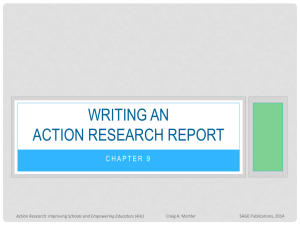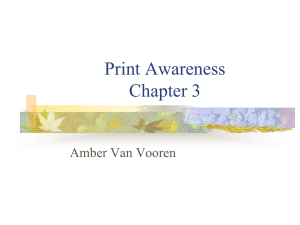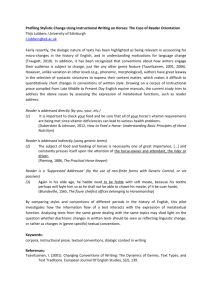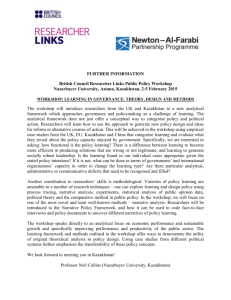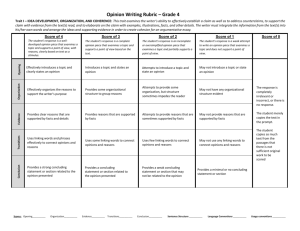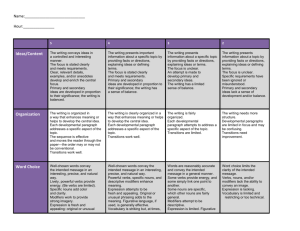IC PROCUREMENT NOTICE
advertisement
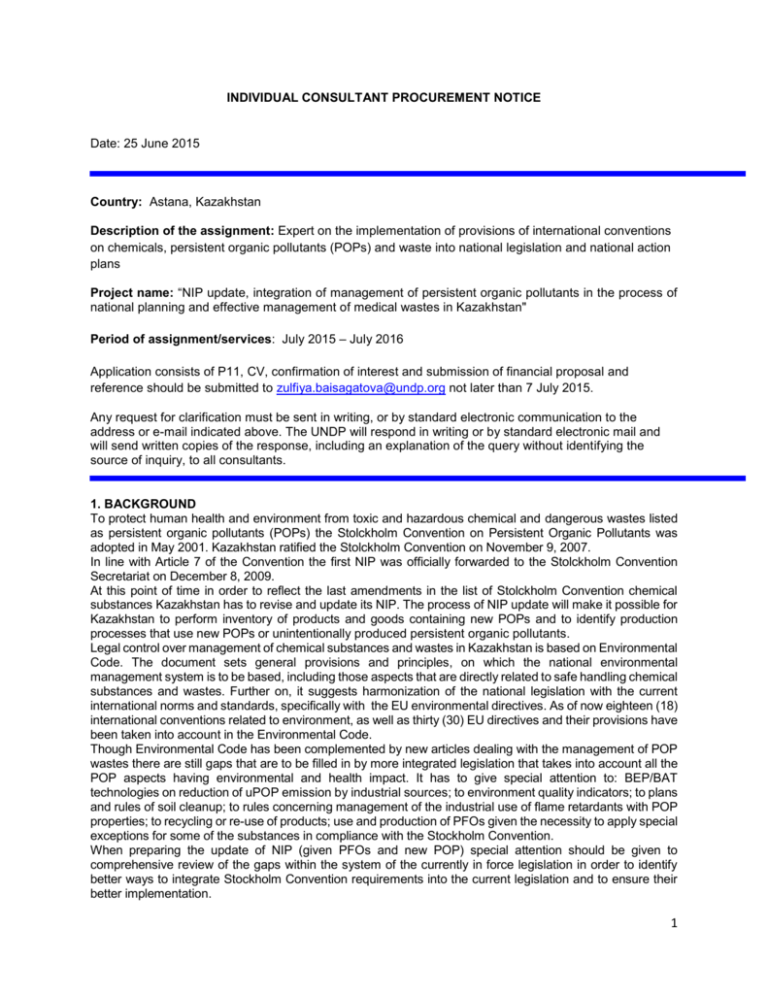
INDIVIDUAL CONSULTANT PROCUREMENT NOTICE Date: 25 June 2015 Country: Astana, Kazakhstan Description of the assignment: Expert on the implementation of provisions of international conventions on chemicals, persistent organic pollutants (POPs) and waste into national legislation and national action plans Project name: “NIP update, integration of management of persistent organic pollutants in the process of national planning and effective management of medical wastes in Kazakhstan" Period of assignment/services: July 2015 – July 2016 Application consists of P11, CV, confirmation of interest and submission of financial proposal and reference should be submitted to zulfiya.baisagatova@undp.org not later than 7 July 2015. Any request for clarification must be sent in writing, or by standard electronic communication to the address or e-mail indicated above. The UNDP will respond in writing or by standard electronic mail and will send written copies of the response, including an explanation of the query without identifying the source of inquiry, to all consultants. 1. BACKGROUND To protect human health and environment from toxic and hazardous chemical and dangerous wastes listed as persistent organic pollutants (POPs) the Stolckholm Convention on Persistent Organic Pollutants was adopted in May 2001. Kazakhstan ratified the Stolckholm Convention on November 9, 2007. In line with Article 7 of the Convention the first NIP was officially forwarded to the Stolckholm Convention Secretariat on December 8, 2009. At this point of time in order to reflect the last amendments in the list of Stolckholm Convention chemical substances Kazakhstan has to revise and update its NIP. The process of NIP update will make it possible for Kazakhstan to perform inventory of products and goods containing new POPs and to identify production processes that use new POPs or unintentionally produced persistent organic pollutants. Legal control over management of chemical substances and wastes in Kazakhstan is based on Environmental Code. The document sets general provisions and principles, on which the national environmental management system is to be based, including those aspects that are directly related to safe handling chemical substances and wastes. Further on, it suggests harmonization of the national legislation with the current international norms and standards, specifically with the EU environmental directives. As of now eighteen (18) international conventions related to environment, as well as thirty (30) EU directives and their provisions have been taken into account in the Environmental Code. Though Environmental Code has been complemented by new articles dealing with the management of POP wastes there are still gaps that are to be filled in by more integrated legislation that takes into account all the POP aspects having environmental and health impact. It has to give special attention to: BEP/BAT technologies on reduction of uPOP emission by industrial sources; to environment quality indicators; to plans and rules of soil cleanup; to rules concerning management of the industrial use of flame retardants with POP properties; to recycling or re-use of products; use and production of PFOs given the necessity to apply special exceptions for some of the substances in compliance with the Stockholm Convention. When preparing the update of NIP (given PFOs and new POP) special attention should be given to comprehensive review of the gaps within the system of the currently in force legislation in order to identify better ways to integrate Stockholm Convention requirements into the current legislation and to ensure their better implementation. 1 Strengthening capacities for industries and other relevant stakeholders on POPs management, including uPOPs and mercury is a topical issue. Legislation of Kazakhstan does not set emission standards for waste incineration or any other technical requirements for the given process. However, waste incinerator, as any other object of waste disposal, is to be assessed in terms of its environmental impact and has to obtain a permit for waste utilization before it sets to work. The given permit includes requirements on release of some pollutants, with the exception of uPOPs and heavy metals, with the follow up payment of relevant environmental duties. However, in reality pollution test checks are not performed; the volume of incinerator emissions is estimated theoretically in the process of getting a permit for its operation and later is to be adjusted and monitored by its owner. Thus, monitoring and control over emissions resulting from waste incineration is practically inexistent. Considerable deterioration of environmental situation is observed during incineration of infectious wastes, which according to generally accepted practice, undergo bromine chlorine disinfection prior to incineration, which leads to still greater release of dioxins and furans; chlorine compounds are released in disposal fields as well. 2. OBJECTIVE AND SCOPE OF WORK: Scope of work: To achieve «NIP update, integration of POPs into national planning and promoting of sound healthcare waste management in Kazakhstan” Project`s objectives (Component 1) the expert will perform the following activities: 1. Development of key proposals for inclusion into national legislation and national Action Plans on the issues of Rotterdam, Stockholm and Basel Conventions, including: - collection of materials and database creation on three conventions implementation; - analysis of implementation of three conventions topical provisions in the Republic of Kazakhstan; - analysis of the best international practice on three conventions implementation; - analysis of provisions of three conventions and resolutions of the Conferences of the Parties in order to identify their priority for implementation in the Republic of Kazakhstan. 2. Development of drafts regulations and program documents, including: - collection of materials and database creation on three conventions implementation; - analysis of legislation, documents on state planning and institutional structure of state bodies and organizations of the Republic of Kazakhstan for compliance thereof with three conventions provisions and resolutions of Conferences of Parties; - analysis of current situation, the best practices, international and national regulations and program documents; - development of the proposals on institutional structure of state bodies and organizations, responsible for three conventions implementation, assistance in organization of this structure; - preparation of standard national reports of the Republic of Kazakhstan on three conventions; - development of long-term plan of national reports submission and proposals on amendment of statistical and sectoral reporting national systems; - development of Roadmap of Actions for Stockholm, Rotterdam and Basel Conventions implementation; - development of proposals on organization of public informing and education system and collaboration with NGO on three conventions implementation issues. 3. EXPECTED RESULTS AND PAYMENTS: No. 1 2 3 4 Expected results Database on three conventions implementation formed. Analysis on implementation of three conventions provisions in Kazakhstan prepared. Analysis of the best international practice on three conventions implementation prepared. Analysis of provisions of three conventions and resolutions of the Conferences of the Parties in order to identify their priority for implementation in RK prepared. Timing 2 weeks after contract signing Payment August 2015 30% August 2015 September 2015 30% 2 5 6 7 8 9 10 Analysis of legislation, documents on state planning and institutional structure of state bodies and organizations of the Republic of Kazakhstan for compliance thereof with three conventions provisions and resolutions of Conferences of Parties prepared. Analysis of current situation, the best practices, international and national regulations and program documents prepared. Proposals on institutional structure of state bodies and organizations, responsible for three conventions implementation, assistance in organization of this structure developed. Standard national reports of the Republic of Kazakhstan on three conventions are developed. Long-term plan of national reports submission and proposals on amendment of statistical and sectoral reporting national systems developed. Roadmap of Actions for Stockholm, Rotterdam and Basel Conventions implementation developed. Proposals on organization of public informing and education system and collaboration with NGO on three conventions implementation issues developed. Progress report. October 2015 February 2016 March 2016 30% May 2016 June 2016 July 2016 10% 4. REQUIREMENTS FOR EXPERIENCE AND QUALIFICATIONS Academic qualification: Bachelor’s degree in the field of law, international relations or natural sciences. Required skills and experience minimum 7-year experience in the field of environment; minimum 5-year experience in the field of international cooperation; experience in collaboration with governmental and scientific organizations in the field of environment, as well as with international organizations; experience in project implementation in the field of chemical safety in the international organization; experience in drafting laws and regulations; experience in preparation and development of analytical documents; experience in use of computer and office equipment (MS Word, Excel, etc.); knowledge of English and Kazakh is an asset. 5. DOCUMENTS TO BE INCLUDED WHEN SUBMITTING THE PROPOSALS. Interested individual consultant must submit the following documents/information to demonstrate their qualifications: 1. Filled and signed P11. 2. Personal CV including past experience in relevant field/area. 3. Standard letter on confirmation of interest and submission of financial proposal. 6. FINANCIAL PROPOSAL Lump sum contract 3 Please note that the financial proposal is all-inclusive and shall take into account various expenses incurred by the consultant/contractor during the contract period (e.g. fee, health insurance, vaccination and any other relevant expenses related to the performance of services...). The financial proposal shall specify a total lump sum amount, and payment terms around specific and measurable (qualitative and quantitative) deliverables (i.e. whether payments fall in installments or upon completion of the entire contract). Payments are based upon output, i.e. upon delivery of the services specified in the TOR. In order to assist the requesting unit in the comparison of financial proposals, the financial proposal will include a breakdown of this lump sum amount (including travel, per diems, and number of anticipated working days with daily rate). 7. EVALUATION 1. Only shortlisted candidates will be considered for the Technical Evaluation. The shortlisting will be based on respective educational background and minimal requirements for work experience. 2. Individual consultants will be evaluated based on the following methodology: Cumulative analysis When using this weighted scoring method, the award of the contract should be made to the individual consultant whose offer has been evaluated and determined as: a) Responsive/compliant/acceptable, and b) Having received the highest score out of a pre-determined set of weighted technical and financial criteria specific to the solicitation. * Technical Criteria weight: 70% - 500 * Financial Criteria weight: 30% - 214 Minimum passing score for technical evaluation is 70%, which is 350 points Criteria Weigh % Max.points Technical: Bachelor in the field of law, international relations or natural sciences 15 75 Minimum 7-year experience in the field of environment 20 100 Minimum 5-year experience in the field of international cooperation 20 100 Experience in collaboration with governmental and scientific organizations in the field of environment, as well as with international organizations 15 75 Experience in project implementation in the field of chemical safety in the international organization Experience in drafting laws and regulations Total Total technical score: Total financial score: 15 75 15 100% 70% 30% 75 500 350 214 ANNEX ANNEX 1 - TERMS OF REFERENCES (TOR) – [to be provided by procuring unit with the individual consultant procurement notice] ANNEX 2 - INDIVIDUAL CONSULTANT GENERAL TERMS AND CONDITIONS – [to be provided by procuring unit with the individual consultant procurement notice] 4
